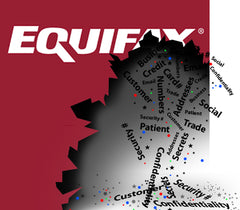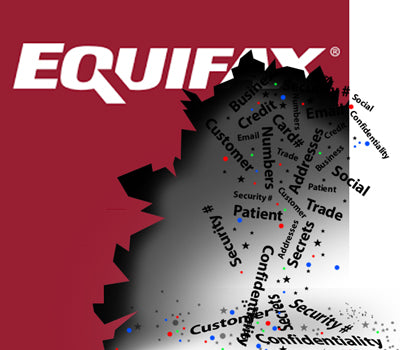 This is a big one. Almost half of the United States population could have their credit information exposed by hackers in an historic data breach with Equifax, the nation’s leading credit-reporting company. As many as 143 million or more customers could be affected by the cyberattack which is presumed to have taken place from mid-May through July 2017, and cybersecurity firms are still struggling to determine the extent of the damage.
This is a big one. Almost half of the United States population could have their credit information exposed by hackers in an historic data breach with Equifax, the nation’s leading credit-reporting company. As many as 143 million or more customers could be affected by the cyberattack which is presumed to have taken place from mid-May through July 2017, and cybersecurity firms are still struggling to determine the extent of the damage.
Rick Smith, Chairman and CEO of Equifax announced this statement in a video released on Equifax's new website dedicated specifically to the breach,
"On July 29th of this year we discovered that attackers had gained unauthorized access to certain Equifax data files, we acted immediately to stop the intrusion...”
The attack was discovered at the end of July 2017 when Equifax realized that attackers had gained unauthorized access, putting social security numbers, credit card numbers, driver’s license numbers and personal data of over 143 million consumers at high risk.
As a result, Equifax is providing information on their new website launched on September 7, 2017 dedicated specifically to managing this breach, and to assist consumers in dealing with the incident. On the website, Rick Smith, Chairman and CEO of Equifax released a statement in the video, indicating that their company is offering free credit file monitoring for every U.S. consumer.
Rick Smith, CEO of Equifax states, “To that end, we’re taking [an] unprecedented step, of offering every U.S. consumer in the country a comprehensive package of identity theft protection and credit file monitoring at no cost.”
Their company has also launched a special call center dedicated to providing consumers with information to manage their personal situation, perhaps costing Equifax millions upon millions of dollars in the long run. The embarrassment and rupture in reputation alone is enough to make any organization shutter.
With vast data breach examples like credit bureau giant Equifax, and many other organizations in retail, medical, and financial experiencing vast data breaches like this despite cybersecurity efforts, it's no wonder organizations are beginning to question how they could ever protect their data. Can organizations protect information, and still be able to conveniently work remotely to conduct business? The answer is yes they can.
Kanguru's Secure Solutions Separate Sensitive Data From the Internet
This incident once again calls attention to vulnerabilities associated with organizations that have sensitive data accessible by the internet despite efforts to prevent unauthorized access through cybersecurity measures. Cybersecurity can only go so far. The breach demonstrates the need for organizations to have better procedures that separate delicate information from having any access via the web, but still retain its convenience and mobility.
The best way to handle a data breach is to prevent one in the first place. There's no question that sensitive data stored locally under hardware encryption is the safest way to secure and protect data. However, in today's global atmosphere, organizations need access to the information to work remotely, quickly and easily within an ideal secure environment. Kanguru provides several excellent solutions for organizations who seek to establish a separation model of sensitive data from the internet, while maintaining an ideal, convenient environment in which to conduct and manage business remotely:
- Kanguru Defender® secure, AES 256-Bit hardware encrypted drives
- KRMC™, Remote Management of secure data storage drives
- Kanguru Endpoint Protector™
By restricting data on-the-go to password-protected, encrypted flash drives or hard drives, the only possible access to the data is restricted solely to the individual user with a password. With Kanguru Defender® AES hardware encrypted drives, the data is entirely under the complete control of the user with password access and remains physically in the hands of the user. Along with military-grade hardware encryption, other key features such as on-board anti-virus and a physical write protect switch further remove all possibility of a breach of the data. With a compartmentalized approach, organizations can ensure complete control over their data, eliminating the vulnerability entirely.
With Kanguru Remote Management Console™ (KRMC™), even though it utilizes cloud access to the internet for monitoring drive activity, it has no access at all to the actual data itself. Administrators can monitor where the data is by locating when and where the USB drive was last plugged in, and if necessary, wipe or disable the drive if it is ever lost or stolen, but the data always remains secured. This provides ideal security to manage the data by managing where the drives are being used and when.
Administrators using Kanguru Endpoint Protector can also monitor other types of activity, specifically types of data transferred over Email, instant messaging, mobile devices, and even screen shots made on a computer. With Endpoint Protector IT Administrators can even create a blacklist of potential devices that might pose threats to a network, and whitelist devices that are approved.
Want to learn more about Kanguru’s ideal solutions to protect data and your organization? Call us today at 1 508 376-4245 or email us at sales@kanguru.com, to speak with our informative sales team to discuss a customized option for you and your organization. You may also visit these pages on our website by clicking the links below to learn more:
Kanguru Defender® AES 256-Bit Hardware Encrypted Drives
Kanguru Remote Management Console™ (KRMC™)
Kanguru Endpoint Protector™
For more information regarding the Equifax package of identity theft protection, visit the Equifax security website at www.equifaxsecurity2017.com.
FOR MORE INFORMATION, PLEASE CONTACT:
Kanguru Solutions
sales@kanguru.com
508.376.4245

